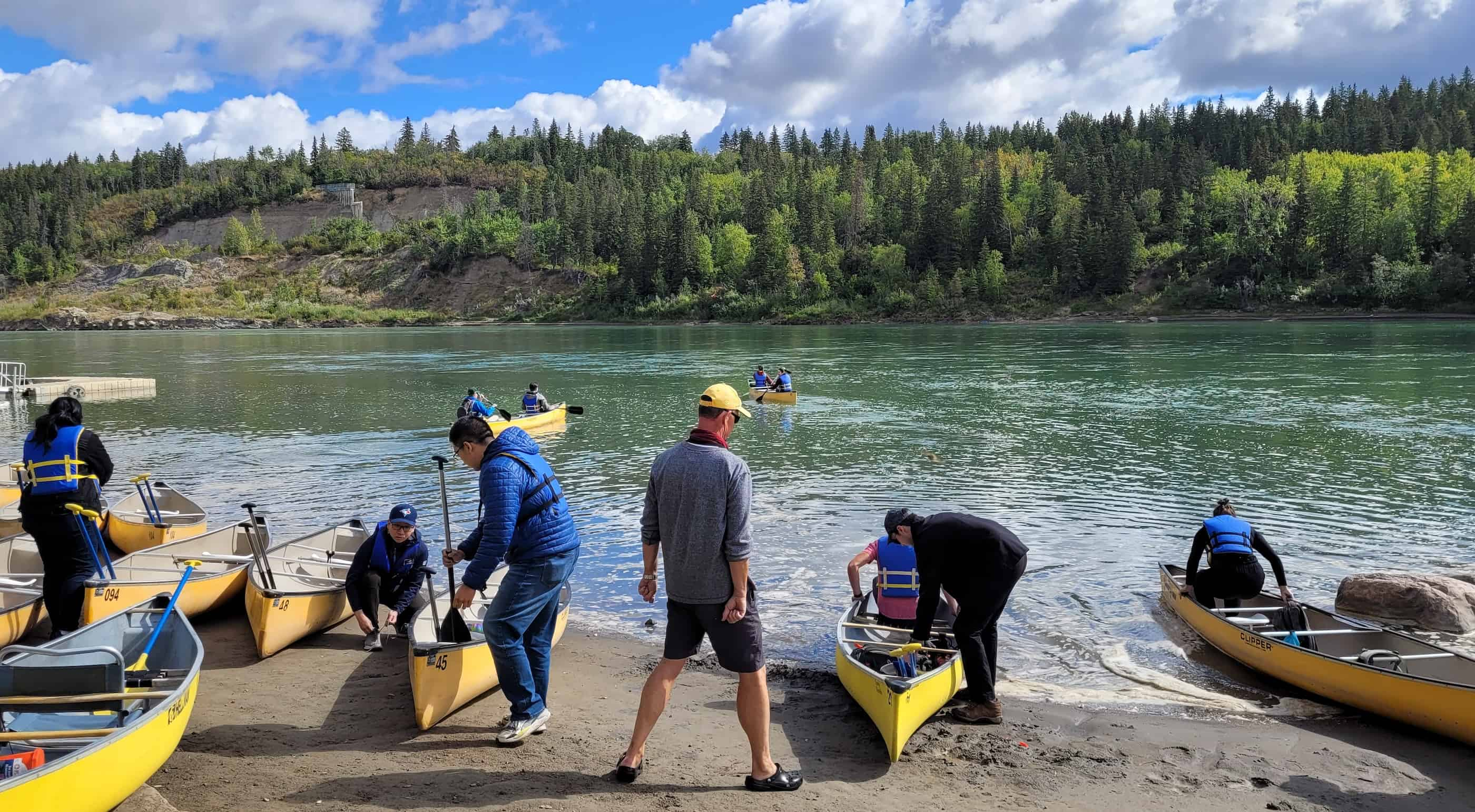Connecting Currents: A Watershed Journey of Collaboration and Learning
Donna McKinnon - 12 September 2024

As part of the Engineering Water School pilot program, 14 engineering students, Maricor Arlos, assistant professor in the Department of Civil and Environmental Engineering, and Lisa Bluteau, experiential learning coordinator in the Faculty of Engineering, embarked on a six-day journey of learning and reflection along the North Saskatchewan River watershed.
Guided by this year’s theme — Connecting Currents: A Watershed Journey of Collaboration and Learning — the group followed the 319 km watershed from its headwaters in the Rocky Mountains to Edmonton.
In alignment with the Faculty of Engineering’s commitment to providing experiential learning opportunities to students as a crucial part of their engineering education, and the University of Alberta’s Indigenous Strategic Plan — Braiding Past, Present and Future — the students’ transformative journey began in Rocky Mountain House where the Âsokêwin Friendship Centre hosted a smudging and drumming ceremony to foster positive mindset throughout the Water School.
This was followed by a “Water Balance for Healing” exercise on the banks of the North Saskatchewan River at the Rocky Mountain House National Historic Site. The group learned about the significance of water to Indigenous Peoples, including the traditional role of women as water protectors and defenders. The students also learned how water is a spirit and is interconnected with all living things.
These activities grounded the group throughout their “Water Walk”, deepening and expanding their emotional knowledge and connecting them to their responsibility as future engineers to all humankind.
Other activities included an Indigenous-led guided ice walk on the Athabasca Glacier with Zuc’min Guiding, a visit to a water testing station facilitated by the North Saskatchewan Watershed Alliance at the confluence of the Cline River and Abraham Lake, a visit to TransAlta’s Bighorn Dam, a tour from Associated Engineering of the upgraded water treatment facilities in the Stoney Nakoda community at Big Horn 144A, a tour of a floating wetland that serves as a natural filter at a wastewater lagoon in Brazeau County, and a meeting with a cattle rancher who has implemented sustainable water practices and increased critical riparian (vegetated lands beside streams, rivers, lakes and wetlands) areas in their pastures. Activities were enhanced with evening sharing circles among the group to debrief, reflect and discuss their learning.
“I really valued the time that we spent on the Bighorn 144A Reservation, as it gave me insights into not only water and wastewater treatment in rural areas, but also the specific challenges that there are in Indigenous communities. I also really enjoyed the time that we spent at the Cline River learning about watersheds. These were two experiences that I would consider to be "hidden gems" since I didn't think that they would stand out, but I was happily mistaken as they really helped me grasp how water is used and valued.” — Alexander Laycock, 6th year Environmental Engineering Co-op
Through these experiences, students significantly expanded their understanding of water resources, water/wastewater treatment and water quality management as well as the critical practices and methods that are required to maintain the balance between community, industry and a healthy North Saskatchewan River.
“This week might have been the best week of my summer (possibly also my degree??). This program prepares students for being better and more mindful engineers as well as better connected people. It connects students to each other and to the NSR water shed. I think we often forget the scale of how big things really are, and this program helps put it in perspective.” — Melissa Bennett, 6th year Environmental Engineering Co-op
With the inaugural year a success, the Faculty of Engineering plans to offer Engineering Water School in 2025. To learn more about this program and other experiential learning opportunities in the Faculty of Engineering, please email: engg.experiential.learning@ualberta.ca or visit uab.ca/engg-el.
Learn more about Indigenous Peoples relation to water:
- Acharibasam, J.B., Hurlbert, M., Datta, R. and wâsakâyâsiw Lewis, K. 2024. Meanings of indigenous land-based healing and the implications for water governance. EXPLORE, Volume 20, Issue 5, September–October 2024, 102998
See more photos of Engineering Water School at the Faculty of Engineering’s Instagram account